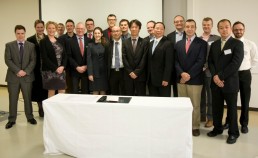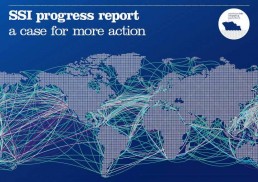Driving Transformation through the Value Chain
This summary paper highlights how charterers are becoming a powerful force in driving sustainable shipping standards and becoming a catalyst for instigating industry change beyond regulation.
Initiatives by SSI members such as AkzoNobel, Cargill and Bunge have highlighted the clear link between pro-actively implementing new, innovative measures within their shipping operations as part of wider business-led sustainability strategies, and achieving significant tangible financial and environmental benefits as a result.

Sustainable Shipping Initiative signs Shared Commitments
MEDIA RELEASE
SUSTAINABLE SHIPPING INITIATIVE SIGNS SHARED COMMITMENTS
Collective pledges will build on individual member initiatives to accelerate change and set industry-wide best practices for sustainability
London, 29th October 2014 – The Sustainable Shipping Initiative (SSI), a pioneering coalition of companies from across the global shipping industry focused on uniting commercial growth with sustainable behaviours, has announced that all of its members have signed a set of shared commitments to set a clear benchmark for sustainable practices. These shared commitments also aim to create greater clarity and momentum on the minimum needed across the industry if we are to achieve its vision of a truly sustainable industry by 2040.
By signing up to the commitments, each member agrees to:
- Publicly report on sustainability
- Have a sustainability strategy that links to its core business
- Set clear reduction targets for environmental issues that are most material to their activities (as per their impacts and an agreed list)
- Deliver a positive impact on people and society
These joint pledges set a baseline for sustainable practices throughout the SSI and will galvanise the individual efforts of participating companies. They are designed to create real transparency and accountability amongst the membership, serving to drive performance improvement. Most importantly, by delivering against these shared commitments, sustainability will become a core element of business strategy as well as a key barometer for decision-making, driving innovation, as well as progressive and more profitable change.
The shared commitments will also be used as a guideline for new members’ requirements. The most recent members to join the SSI, and who have signed up to the shared commitments, include the American Bureau of Shipping (ABS), one of the world's leading ship classification societies, and IMC Group, a global industrial supply chain and logistic solutions provider. As progress is achieved, the commitments will be refreshed to stretch performance targets and future aspirations.
Alastair Fischbacher, director, The Sustainable Shipping Initiative said: “The SSI’s members recognised that having consensus and consistency around some of the core elements of sustainable business practices is essential. Due to the scope of the shipping supply chain and the players in it, these commitments have to be relevant to everyone, simple to understand and easily evaluated. At the same time, they need to be meaningful enough to set a benchmark for industry leadership. Putting a stake in the ground to fulfil these four areas in each member’s organisation will provide a foundation for demonstrating tangible progress over time, whilst we continue work as a group on addressing the challenges to a more sustainable industry in line with our Vision.”
Members will have until the end of the year to submit their delivery proposals to the SSI Secretariat. These will be based on a range of options and timescales that are provided as a guide to provide flexibility in approach and to reflect the differences in companies’ operations across the value chain. The commitments will also form part of the criteria for joining the SSI and are designed to encourage uptake by providing greater clarity on some of the organisation’s goals.
Stephanie Draper, co-founder and Chair of the SSI concluded: “These commitments signal areas for taking immediate action. Tackling fundamental issues such as defining what areas of sustainability are material to an organisation, and how these should be addressed to meet business goals, are critical to any major company’s long-term survival. Naturally some of our members will be further along in these journeys than others, but by making solid, incremental steps to instigate change and share our results, we hope to inspire other companies within the wider industry to follow suit and realise the commercial benefits for themselves.”
More information about the SSI is available here.
ENDS
About the Sustainable Shipping Initiative
The Sustainable Shipping Initiative (SSI) is an ambitious coalition of shipping leaders from around the world that is taking practical steps to tackle some of the sector’s greatest opportunities and challenges. The group is working to achieve a vision of an industry in which sustainability equals success.
It is the first time the shipping industry has joined forces on such a cooperative global scale to tackle big sustainability issues. The ultimate goal is to show that collaborative action is possible, and to mobilise support across the industry, demonstrating that shipping can contribute to – and thrive in – a sustainable future.
The cross-industry SSI members of over 19 companies represent ship owners and charterers, shipbuilders, engineers and service providers, banking, insurance, and classification societies. Member companies are ABN AMRO, AkzoNobel, American Bureau of Shipping, Bunge, Cargill, Carnival Corporation, China Navigation Company, DNV GL Group, Gearbulk, Lloyd’s Register, IMC Group, Maersk Line, Namura Shipbuilding Co, Rio Tinto Marine, U-Ming Marine Transport Corporation, Unilever and Wärtsilä.
In September 2013 the SSI became an independent charity. The SSI was initially facilitated by global sustainability non-profit Forum for the Future in conjunction with WWF, the global conservation NGO. Forum for the Future and WWF remain as SSI NGO members.
For media enquiries please contact:
Amanda Lyons
BLUE Communications
T: +44 (0)771 100 8624
E: Amanda.lyons@blue-comms.com
Follow SSI on Twitter @SustShipping
Follow the Sustainable Shipping Initiative (SSI) on Twitter @SustShipping for daily sustainability related tweets and updates.
Rating schemes
Sustainable shipping rating schemes: How to use and improve sustainability rating schemes in shipping
Time period: 2012-2013
Members involved: BP Shipping, Carnival Corporation, DNV, Forum for the Future, Maersk, Lloyd’s Register, Rio Tinto, Unilever, WWF
Partners: Southampton Solent University
Beyond-compliance rating schemes benchmark vessels on their sustainability performance, allow customers and other stakeholders to select ships and reward shipowners based on a credible assessment of their sustainability.
The SSI believes that increased demand for rating schemes has the potential to create significant change in the industry and therefore seeks to contribute towards an increase in the uptake of rating schemes across the industry through greater awareness and understanding.
To provide and improve the transparency and comparability that enables cargo owners, charterers and shipowners to integrate sustainability considerations into commercial decisions, and to move toward a more sustainable shipping industry.
The challenge for the SSI was to find ways of helping the shipping industry and its customers navigate the growing number of beyond-compliance rating schemes, to encourage wider adoption of rating schemes and to improve sustainability performance in the shipping industry.
Stakeholder research by Southampton Solent University identified five main barriers to uptake:
- Lack of demand from the shipping industry’s customers due to low awareness
- Perception of cost to the industry – initiatives must demonstrate a financial gain
- Critical mass in the market – wide engagement must be industry driven
- Standardisation in the way parameters are measured, e.g. CO2, SOx and NOx
- Alignment with and between different industry sectors
- Credible Benchmarking Work Stream – Slide deck
- A web-based guidance resource designed to assist cargo owners, charterers and shipowners in the selection process of rating schemes. NB: This resource is not up to date http://ssi.brenock.com
Closed-loop materials management
Time period: 2013-2013
Members involved: Carnival Corporation, The China Navigation Company, Lloyd’s Register, Maersk, DSME
Partners: HP, University of Strathclyde, Forum for the Future
Through three pilot projects and a stakeholder consultation process, the SSI set out to investigate and explore the feasibility and value of tracking and tracing the materials used in ship construction and ensuring accountability for the environmental impacts of materials used for shipbuilding.
Increased transparency and traceability further lead to more open supply chain relationships and opportunities for remanufacture, as well as more upcycling and reuse.
The key challenge for the work group was to look at how ships could be designed, built, operated and dismantled to deliver better and more efficient recycling of materials and components as well as establishing whether this would increase a ship’s value.
To achieve end-to-end responsibility and accountability for the social and environmental impacts of the materials used to build ships, from their sources and construction through to recycling.
The work group implemented three pilot projects which collected data about more than 96% (by weight) of all the materials used in the construction of two new vessels and a cruise ship cabin.
The purpose of these investigations was to establish the value of collecting data about materials used in ship construction. In addition, the SSI collaborated with Hewlett-Packard to trial the use of the CDX system to track and trace the data being collected. Separately, a stakeholder consultation was carried out to explore opportunities for a closed loop economy in the future.
As a result, it was established that:
- A verified record of all materials used in a ship’s construction may increase its value
- A materials database provides a single source of data for reporting on existing regulations, and future-proofs against additional compliance reporting requirements
- Increased transparency and traceability also lead to more open supply chain relationships and opportunities for re-manufacture, as well as more upcycling and reuse
- Creating an effective material tracking culture takes time and commitment, but also enhances social responsibility
- If scaled-up, the impact could be:
- Safer, cleaner, healthier and more profitable ship recycling
- Significant CO2 savings as a result of more effective recycling in the wider ‘steel loop’
- Potential CO2 and financial benefits from ‘design for remanufacture and reuse’ strategies
Clean technology
Time period: 2012-2013
Members involved: BP Shipping, Bunge, Cargill, Gearbulk, Forum for the Future, Lloyd’s Register, Namura, Rio Tinto, U-Ming, Wärtsilä
The global shipping industry needs to achieve a step change in the way it harnesses energy as part of its action on climate change. If the industry were to double in size by 2040 while playing its part in delivering global emissions cuts by 50%, it would need to cut its own emissions per tonne km by 75%. To achieve this, incremental improvement will not be sufficient.
However, it remains difficult for step-change technologies to make the leap from the drawing board onto the water, and to build business cases that will enable the mass uptake of combined voyage optimisation techniques. There is a limited appetite for risk in the shipping industry, making it difficult to demonstrate the benefit that new technologies can deliver at full scale.
The SSI explored how to overcome barriers to the uptake of new technologies and innovative techniques which improve the operational efficiency of ships, potentially delivering energy efficiency savings of 10% of more and payback periods of less than 5 years.
To enable the widespread uptake of step-change technologies and operational techniques that will contribute to the reduction of ship energy consumption and dramatically cut GHG emissions.
The work group collaborated with key suppliers of new technologies available in the industry and evaluated the potential of these technologies to deliver energy efficiency savings.
Research and analysis were conducted on cost-benefit analysis, risks and applicability. These technologies, mainly wind-assisted propulsion and hull/lubrication innovations were selected because of their potential to deliver double-digit savings, while being unproven at full scale.
Members shared data on the implementation of measures such as slow steaming, weather routing and virtual arrival, along with the savings achieved and barriers to implementation.
This resulted in five case studies examining in-depth the specific opportunities presented by the innovations, together with more general lessons on how we can accelerate the uptake of new technologies ‘on the water’.
- A step change in energy technology innovation and uptake – Slide deck (2013)
- Checklist for technology suppliers (2013)
- Member case studies in technology evaluation (2013)
Financing sustainable shipping: Save As You Sail (SAYS)
Time period: 2012-2013
Members involved: ABN Amro, AkzoNobel, Forum for the Future, Maersk, Wärtsilä
Partners: HFW, UNEP Finance Initiative, Deloitte, UCL
Shipowners face competition to charter out fuel-efficient vessels and are often unsure if investing in retrofitting their fleet will lead to an increase in profits, despite the availability of proven, cost-effective technologies. As charter durations get shorter, there are fewer opportunities to share investment with charterers, leading to a split incentive: a ship owner may invest the up-front capital to fit energy-efficient technology, but is not able to recoup the costs from fuel savings, as this goes to the charterers. This problem is particularly apparent for short-term time charters.
The members of the financing work stream of SSI worked together to develop Save As You Sail (SAYS) – a robust financing package to enable both owners and charterers to benefit from efficiency upgrades with a transparent understanding of expected savings, and new financing facilities for fund upfront costs.
To provide the shipping industry with access to financial tools and products to enable informed and transparent negotiations, guaranteed savings, and encourage third-party financing to vessel owners for efficiency upgrades.
Collaborating with knowledge partners across the industry, the work group developed and introduced Save As You Sail (SAYS), a robust financing package that seeks to enable both owners and charterers to benefit from efficiency upgrades.
Using the SAYS model, an owner and a charterer can identify the estimated fuel-cost savings and return on investment associated with different upgrade options; this is used to negotiate and agree on the charter hire rate. The owner has access to a loan for the upfront costs, to be paid back (with fixed-rate interest) over two to three years. If the first charter is shorter than the loan, SAYS enables changes of charterers during the financing period.
With some technologies providing a return on investment of 50% and more, there are sufficient fuel cost savings for the charterer, owner and finance providers to profit from the expected fuel cost savings.
Please note these resources have not been updated and should be used for reference only.
- Financing Sustainable Shipping – Slide deck (2013)
- Summary document of Save As You Sail (2013)
- Financial modelling tool – developed by Deloitte (2013)
- Financial modelling tool – Guidance document (2013)
- Legal issues associated with the SAYS model – developed by HFW (2013)
SSI Members Meeting in Japan
The SSI was proud to have its bi-annual members meeting kindly hosted on 9-11 April 2014 at Imari Shipyard in Japan by Namura Shipbuilding Co.
A signing ceremony signifying commitment to the shared Vision 2040 was delivered by the chair of the SSI board of trustees and Mr. Kensuke Namura, President of Namura Shipbuilding Co. The new signatories additionally include the DNV GL Group, U-Ming Marine Transport Corp. and ABS.
The 18 members from 14 countries also reported on the initiatives of the collaborative working groups and as well as individual activities which are contributing towards the Vision for 2040. The meeting was also instrumental for the development of a roadmap to show the steps that the shipping industry needs to take in order to progress towards fulfilling the Vision.
The meeting included a tour around the Imari shipyard in Imari-city, Saga prefecture.
A Case For More Action progress report launched and available for download
The SSI's progress report, A Case For More Action was launched at an industry event in Singapore on 26 September and is now available for download.
The tools and case studies for the shipping industry are included within a new 23-page ‘A Case for More Action’ report which lists the findings and accomplishments of the SSI’s initial four ‘workstream’ projects and details the functional tools that each workstream has developed in response to the specific challenges it faced. The tools range from an Excel financial model and legal checklists through to case studies, performance data and web-based tools.
The four workstreams have made considerable progress in their respective field of ship financing; technology efficiency; recycling and closed-loop materials management and benchmarking of sustainable shipping.
The new ‘A Case for More Action’ report also details the obstacles that the industry has experienced in the first part of its journey towards the agreed goal of a sustainable and profitable shipping industry by 2040. The precise details of the ‘Vision 2040’, the SSI’s manifesto for action, are available at ssi2040.org/what-we-do/vision-2040
The report also outlines suggested next steps to maintain the industry’s route towards the goals in the vision. These will ensure that the industry, which accounts for up to 4 per cent of global CO2 emissions, can contribute towards responsible and efficient use of natural resources, dramatic reductions in greenhouse gas intensity and provision of safe, healthy and secure working environments.
Among the requirements and focuses highlighted in the newly released ‘Case for More Action’ dossier are increased openness and sharing throughout the industry. The report’s findings emphasise the benefits of transparency and sharing in order to reduce the risks associated with investments, accelerate the uptake of innovative technology and stimulate the pace of change throughout the shipping industry.
The new report follows on from a preliminary set of proposals made by senior officials from within the SSI membership in the ‘Case for Action’ document, published in May 2011. The ‘Case for More Action’ report is available for download here https://sustainableshipping.org/what-we-do/case-for-action/.
Jonathon Porritt, founder director of the Forum for the Future, which has been facilitating the SSI, said: “The achievements of the individuals and organisations involved with the Sustainability Shipping Initiative since its inception in 2010 have been impressive. The findings that have been reported and the tangible results that have been accomplished in the areas of ship financing, ship recycling, energy technology and sustainability benchmarking have taken us a way towards our carefully formulated sustainability vision.
“The tools that have been created by the SSI members and are being launched at our September conference will enable the entire industry to move significantly further along the paths towards the targets in the SSI’s ‘Vision 2040’ manifesto.
“The efforts have highlighted the range of challenges and barriers to sustainability and ways to overcome by more openness and collaboration. We call on more organisations to become members of the SSI and join our mission.”
Helle Gleie, the new director of the SSI, who was appointed in September 2013, said: “Following the progress achieved since the creation of the initial ‘Case for Action’ the SSI and its members felt that there was an urgent need to map out the strategy for the next phase of our journey towards a sustainable industry.
“From new vessel types, and new financial models to propulsion through kites and bacteria-based fuels, it is clear that the maritime sector is driving innovation and our new tools and recommendations for future action will accelerate this even further.
“The SSI’s work reduces risks and promotes nimbler work practices to turn efficiency, sustainability and profitability into realities and norms for the shipping sector. Organisations from shipping and related industries should visit ssi2040.org/ssi to join the mission.”
Upcoming event in Singapore: Sustainable Shipping - A Case for More Action
Thursday, September 26, 2013
Traders Hotel, Singapore
Join members of the Sustainable Shipping Initiative (SSI) and other key players from the global shipping industry for a high-profile debate in Singapore and access to a new report. Discussions will revolve around the opportunities, innovations and solutions to barriers to further progress in sustainable shipping.
Date: September 26, 2013
Time: 11am-13:00, followed by drinks and canapé networking until 14:30
Location: Traders Hotel, 1A Cuscaden Road, Singapore
Jonathon Porritt, Founder Director of Forum for the Future, will deliver an inspiring keynote speech, followed by a lively industry panel debate to explore and understand the key opportunities for, and obstacles to, advances in all aspects of maritime sustainability.
Panellists:
- Thomas Riber Knudsen, Chief Executive for Maersk Line in the Asia Pacific, Maersk Line
- Giovanni Ravano, Managing Director - Shipping and Coal Division, Bunge
- Nigel Jones, Managing Director, Rio Tinto
- Per Hansson, Vice President Strategy and Innovation, Wartsila
The event will include the launch of the SSI’s first progress report. Register now and book your place in Singapore, one of the world’s busiest and most important shipping hubs, for exclusive access to the report, insight into real sustainable business opportunities and a unique opportunity to network with shipping luminaries and members of the Sustainable Shipping Initiative.
To register please contact Carolyne Okeijn
To keep up-to-date with our latest news, sign up to our mailing list or follow us on Twitter.












